Unit 10 You're supposed to shake hands知识点习题课件(共118张PPT,4课时) 人教版九年级全一册
文档属性
| 名称 | Unit 10 You're supposed to shake hands知识点习题课件(共118张PPT,4课时) 人教版九年级全一册 | 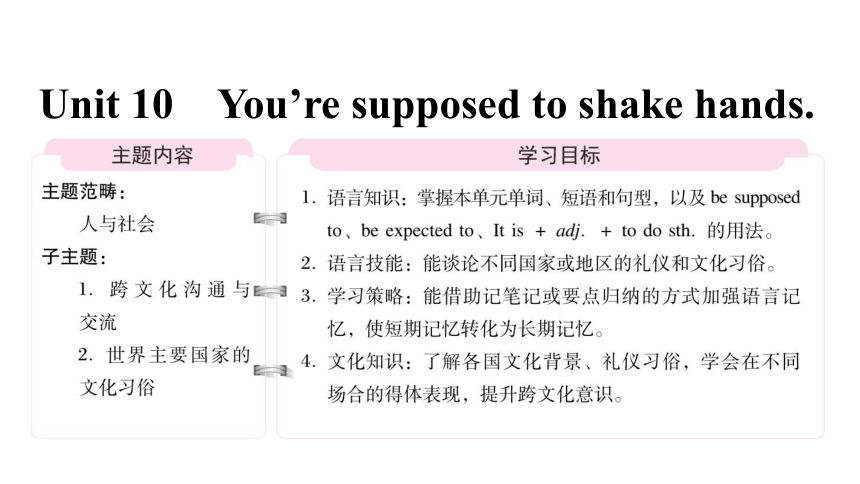 | |
| 格式 | pptx | ||
| 文件大小 | 3.6MB | ||
| 资源类型 | 教案 | ||
| 版本资源 | 人教新目标(Go for it)版 | ||
| 科目 | 英语 | ||
| 更新时间 | 2024-07-23 22:55:13 | ||
图片预览

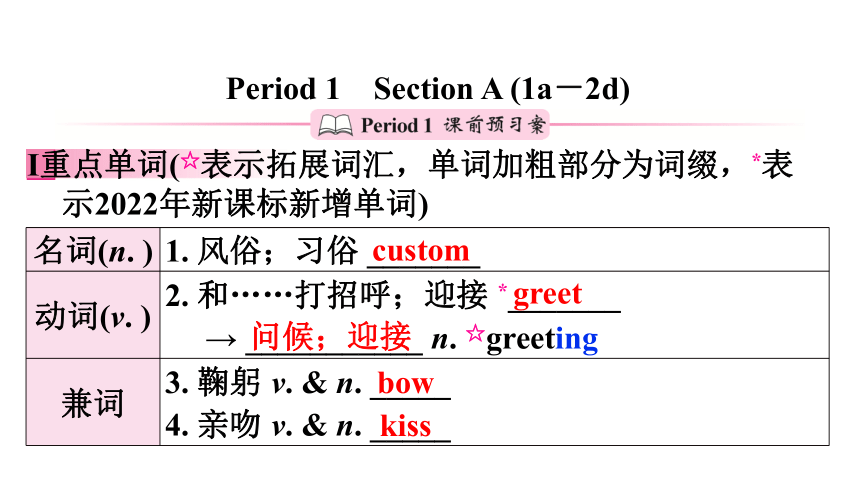
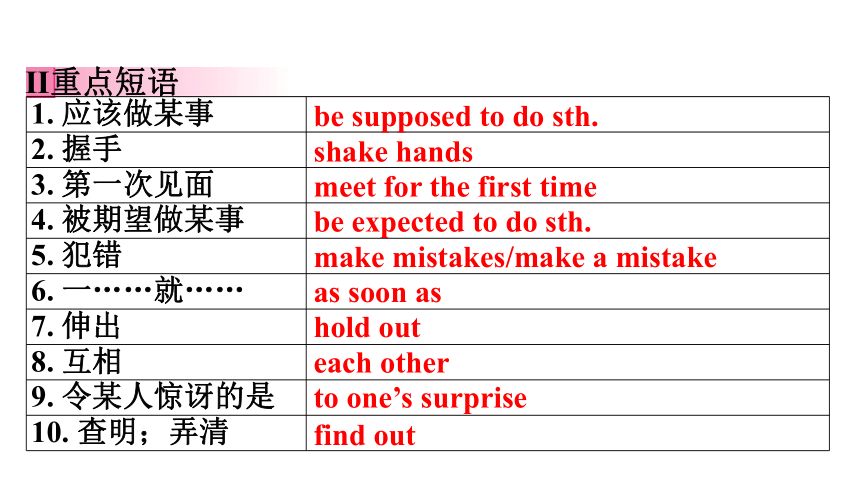
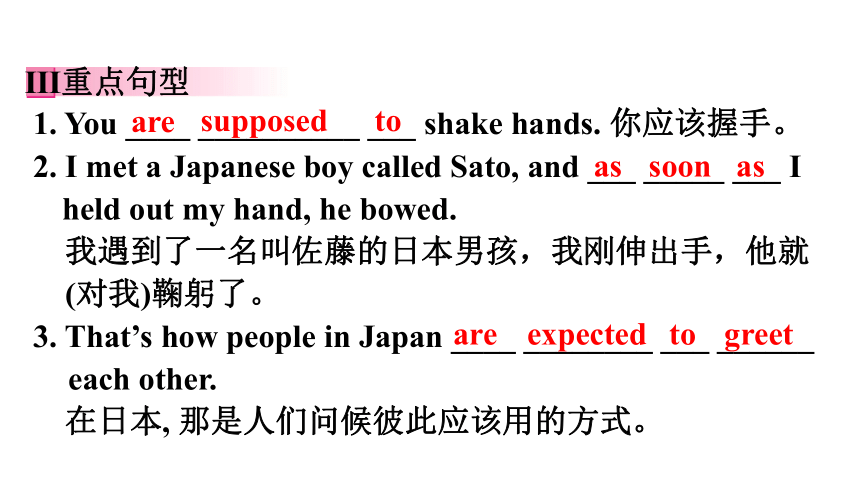
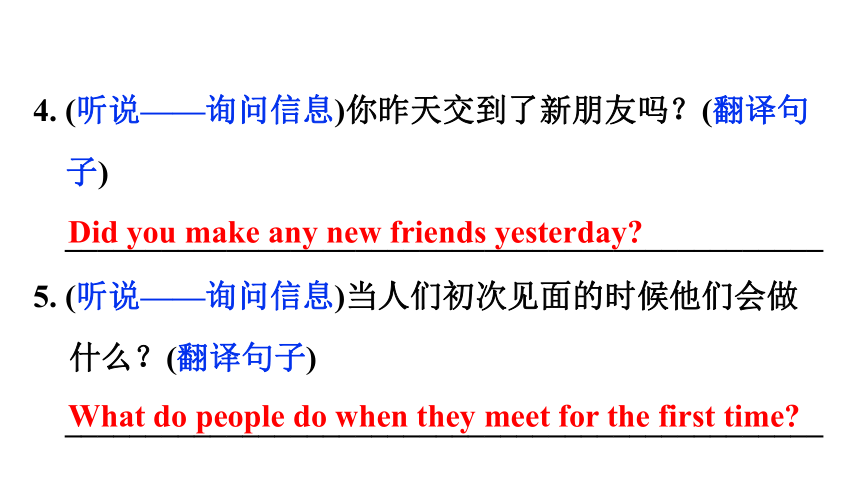
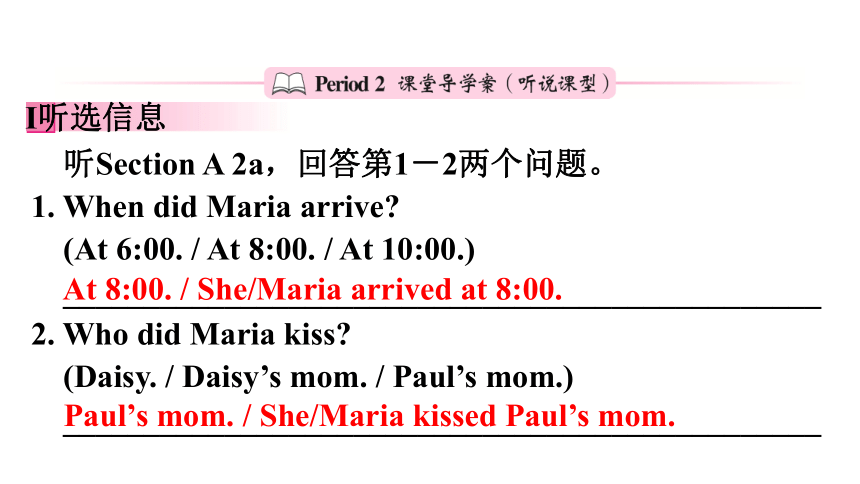
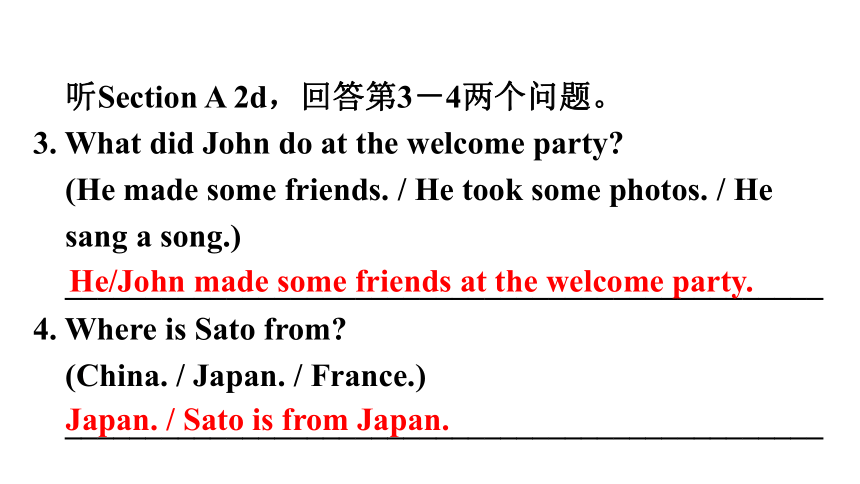
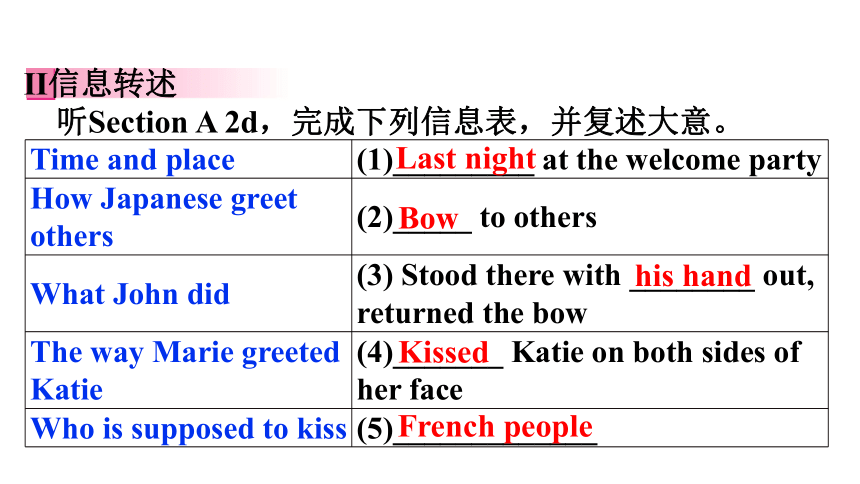
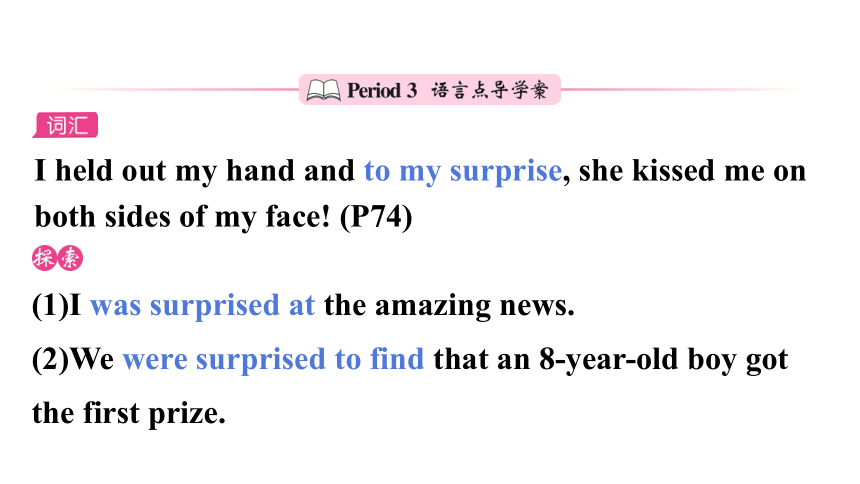
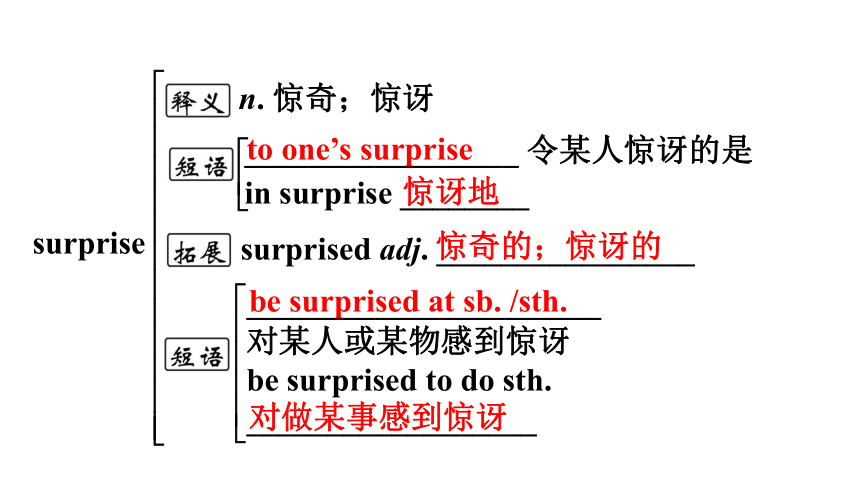
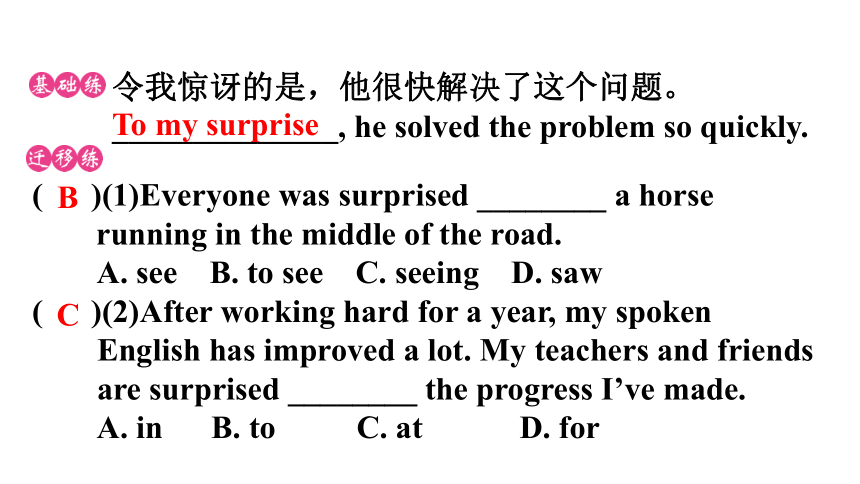
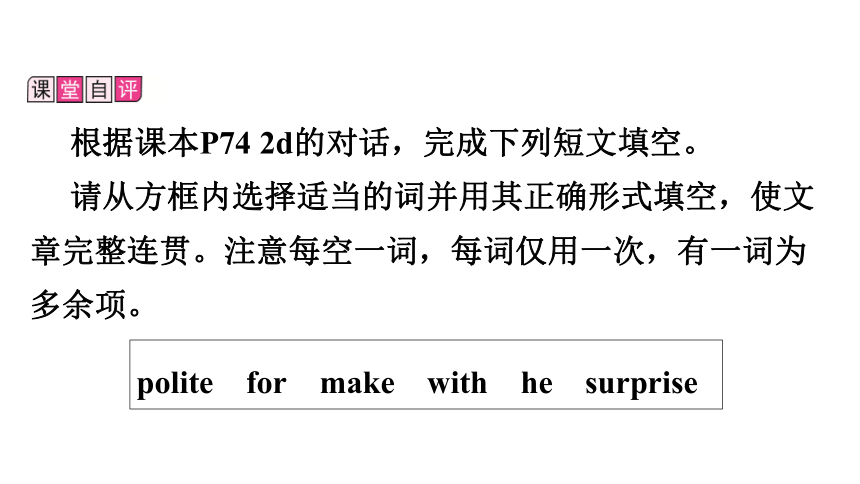
文档简介
(共118张PPT)
Unit 10 You’re supposed to shake hands.
Period 1 Section A (1a-2d)
Ⅰ重点单词(☆表示拓展词汇,单词加粗部分为词缀,*表示2022年新课标新增单词)
名词(n. ) 1. 风俗;习俗 _______
动词(v. ) 2. 和……打招呼;迎接 *_______
→ ___________ n. ☆greeting
兼词 3. 鞠躬 v. & n. _____
4. 亲吻 v. & n. _____
custom
greet
问候;迎接
bow
kiss
Ⅱ重点短语
1. 应该做某事
2. 握手
3. 第一次见面
4. 被期望做某事
5. 犯错
6. 一……就……
7. 伸出
8. 互相
9. 令某人惊讶的是
10. 查明;弄清
be supposed to do sth.
shake hands
meet for the first time
be expected to do sth.
make mistakes/make a mistake
as soon as
hold out
each other
to one’s surprise
find out
1. You ____ __________ ___ shake hands. 你应该握手。
2. I met a Japanese boy called Sato, and ___ _____ ___ I held out my hand, he bowed.
我遇到了一名叫佐藤的日本男孩,我刚伸出手,他就(对我)鞠躬了。
3. That’s how people in Japan ____ ________ ___ ______ each other.
在日本, 那是人们问候彼此应该用的方式。
Ⅲ重点句型
are
supposed
to
as
soon
as
are
expected
to
greet
4. (听说——询问信息)你昨天交到了新朋友吗?(翻译句子)
_______________________________________________
5. (听说——询问信息)当人们初次见面的时候他们会做什么?(翻译句子)
_______________________________________________
Did you make any new friends yesterday
What do people do when they meet for the first time
听Section A 2a,回答第1-2两个问题。
1. When did Maria arrive
(At 6:00. / At 8:00. / At 10:00.)
_______________________________________________
2. Who did Maria kiss
(Daisy. / Daisy’s mom. / Paul’s mom.)
_______________________________________________
Ⅰ听选信息
At 8:00. / She/Maria arrived at 8:00.
Paul’s mom. / She/Maria kissed Paul’s mom.
听Section A 2d,回答第3-4两个问题。
3. What did John do at the welcome party
(He made some friends. / He took some photos. / He sang a song.)
_______________________________________________
4. Where is Sato from
(China. / Japan. / France.)
_______________________________________________
He/John made some friends at the welcome party.
Japan. / Sato is from Japan.
听Section A 2d,完成下列信息表,并复述大意。
Ⅱ信息转述
Time and place (1)_________ at the welcome party
How Japanese greet others (2)_____ to others
What John did (3) Stood there with ________ out, returned the bow
The way Marie greeted Katie (4)_______ Katie on both sides of her face
Who is supposed to kiss (5)_____________
Last night
Bow
his hand
Kissed
French people
I held out my hand and to my surprise, she kissed me on both sides of my face! (P74)
(1)I was surprised at the amazing news.
(2)We were surprised to find that an 8-year-old boy got the first prize.
surprise
n. 惊奇;惊讶
_________________ 令某人惊讶的是
in surprise ________
surprised adj. ________________
______________________
对某人或某物感到惊讶
be surprised to do sth.
__________________
to one’s surprise
惊讶地
惊奇的;惊讶的
be surprised at sb. /sth.
对做某事感到惊讶
令我惊讶的是,他很快解决了这个问题。
______________, he solved the problem so quickly.
( )(1)Everyone was surprised ________ a horse running in the middle of the road.
A. see B. to see C. seeing D. saw
( )(2)After working hard for a year, my spoken English has improved a lot. My teachers and friends are surprised ________ the progress I’ve made.
A. in B. to C. at D. for
To my surprise
B
C
根据课本P74 2d的对话,完成下列短文填空。
请从方框内选择适当的词并用其正确形式填空,使文章完整连贯。注意每空一词,每词仅用一次,有一词为多余项。
polite for make with he surprise
The welcome party for foreign students last night was great. John 1. ______ some new friends. But a funny thing happened. He met a Japanese boy. When John held out 2. ______ hand, the boy bowed. John didn’t know how people in Japan greet each other. It is 3. ________ if he doesn’t return the bow. Katie also remembered a funny thing. When she first met Marie last year, she wanted to shake hands 4. ______ her, too. She wanted to say hello to Marie. To her 5. ________, Marie kissed her on both sides of her face. Later Katie found out French people are supposed to kiss when they see each other.
1. ______ 2. _____ 3. __________ 4. _____ 5. __________
made
his
impolite
with
surprise
made
his
impolite
with
surprise
Period 2 Section A (3a-4c)
Ⅰ重点单词(☆表示拓展词汇,单词加粗部分为词缀,*表示2022年新课标新增单词)
名词(n. ) 1. 首都 _______ 2. 正午 ______
3. 护照 _________ 4. 粉笔 ______
5. 黑板 ____________ 6. 海岸;海滨 ______
7. 季; 季节 _______
8. 努力;尽力 * _____→作出努力 ____________
9. 方式;(pl.)礼仪 * ________
→餐桌礼仪 ______________
capital
noon
passport
chalk
blackboard
coast
season
effort
make an effort
manner
table manners
形容词(adj. ) 10. 放松的;自在的 _______
→令人放松的 adj.☆ _________
11. 很生气;疯的 ______
→大动肝火;气愤 ________
12. 北方的;北部的 _________
→北;北方 n. ☆ _______
13. 东方的;东部的 ______→东;东方n.☆ ____
14. 值得 ______
→这种麻烦是值得的 __________________
relaxed
relaxing
mad
get mad
northern
north
eastern
east
worth
be worth the trouble
兼词 15. 敲击(声) n. 敲;击 v. _______
16. 重视;珍视 v. 价值 n. ______
→ __________________ adj. ☆valuable
knock
value
值钱的;贵重的
Ⅱ重点短语
1. 时间观念不强
2. 在我们的日常生活中
3. 顺便拜访
4. 计划做某事
5. 毕竟
6. 避免繁忙的交通
7. 让某人一直做某事
8. 出国
9. 把……擦掉
10. 脱下(衣服);起飞
be relaxed about time
in our everyday/daily lives
drop by
make plans to do sth./plan to do sth.
after all
avoid heavy traffic
keep sb. doing sth.
go abroad
clean … off
take off
1. Where I’m from, we ____ pretty ________ ______ time.
在我们那里,人们的时间观念不强。
2. We often just walk around the town center, seeing ____ many of our friends ____ ____ ____!
我们经常只是在城镇中心走走,尽可能地见见我们的朋友!
3. After class, students are expected to _____ the chalk ____ the blackboard.
下课后,学生们应该把黑板上的粉笔(字)擦掉。
Ⅲ重点句型
are
relaxed
about
as
as
we
can
clean
off
4. In many eastern European countries, you are supposed to _____ ____ your gloves before shaking hands.
在许多东欧国家,在握手之前你应该摘下你的手套。
5. ____ ____ ____ ____ _____ to be accepted in a foreign country is to try to understand how people think.
在外国被接受的最好的方式之一就是尽力了解人们是怎样想的。
take
off
One
of
the
best
ways
invite
1 If someone invites you to meet him or her at noon, then you’re expected to be there at noon. (P75)
v. 邀请
__________________ 邀请某人做某事
上周末麦克邀请我去野餐。
Mike _______________________ last weekend.
invite sb. to do sth.
invited me to have a picnic
2 So I make an effort to be on time when I meet my friends. (P75)
effort
n. ____________
_______________________ 努力做某事
每个人都应该为节约水资源作出努力。
Everyone should ____________________ water resource.
努力;尽力
make an effort to do sth.
make an effort to save
plan
3 (1)We almost always make plans to see friends. (P75)
(2)We usually plan to do something interesting, or go somewhere together. (P75)
n. & v. ______
__________________________
=plan to do sth. 计划做某事
计划
make plans/a plan to do sth.
( )(1)Sally wants to be a pianist, so she plans ________ her summer holiday practicing the piano.
A. to spend B. spent
C. spending D. spend
(2)【翻译】我们计划明年去伦敦。
______________________________________________________________________________________________
A
We plan to go to London next year. / We make a plan to go to London next year.
We often just walk around the town center, seeing as many of our friends as we can! (P75)
(1)Dylan went to the bus stop as early as possible to catch the first bus.
(2)To catch the first bus, Dylan went to the bus stop as early as he could.
as+n.+as sb. can 尽某人可能……
________________________ 尽可能……
=as+adj. /adv. +as sb. can
形容词或副词用原级
as+adj. /adv. +as possible
( )(1)My mother always tells me to do everything as ______ as possible.
A. careful B. carefully
C. more careful D. more carefully
(2)【翻译】在昨天的跑步比赛上,我尽可能快地跑。
_____________________________________________________________________________________________________________________________________________
B
I ran as fast as possible in the running competition yesterday. / I ran as fast as I could in the running competition yesterday.
I always leave the house early to avoid heavy traffic because I think it’s impolite to keep others waiting.
动词不定式短语作目的状语
省略that的宾语从句
↓
because引导原因状语从句
keep sb. doing sth.
让某人一直做某事
我总是早早地离开家以避免交通堵塞,因为我认为让别人等待是不礼貌的。
1.让我们作出努力来保护环境,与自然和谐相处。
Let’s ______ ___ ______ ____ ________ the environment and live in harmony with nature.
2. 节约食物和拒绝浪费是很重要的。毕竟,俭则不匮。
It’s important to save food and say no to waste. ______ ____, waste not, want not.
3. 看你衬衣上的污渍。请把它擦掉。
Look at the stain on your shirt. Please ______ it ____.
Ⅰ完成句子
make
an
effort
to
protect
After
all
clean
off
4. 汤姆,你的袜子真难闻。你需要把它们脱掉,马上洗一洗。
Tom, your socks smell so terrible. You need to _____ ______ ____ and wash them right away.
5. (能力提升)昨天学生们都尽他们所能地多种树。(翻译句子)
______________________________________________________________________________________________
take
them
off
The students planted as many trees as they could yesterday.
The American-Chinese Culture Exchange Center (ACCEC)
We set up the center last year. All our members want to exchange culture with other countries.① Come and help us make this a reality.
Ⅱ阅读理解
语篇类型:应用文 主题:人与社会(文化交流)
难度: 词数:约210 用时:7分钟数:
Our center is now looking for some volunteers from middle school for our coming summer camp. The summer camp is from August 20th to August 30th in 2025.
During the summer camp, 300 students aged from 7 to 10 will fly from America to China to learn about Chinese culture.② They will visit some places of interest and learn Chinese as well. We will try our best to provide the best camping experience, so we are looking for “the best of the best” volunteers.
◆Skills needed:
Be active in learning.
Always be ready to help. Be good at Chinese and English.
Be patient enough to get on well with children. Be good at communicating with others and work well as a team.③
◆Training:
Before the camp, all volunteers need to receive a 10-day training.④ Learn how to work with the children and how to teach Chinese to them.
◆Age:
14-17 years old.
If you are interested, please send an e-mail to us at accecsummercamp@ by July 20th, 2025 or call Miss Chen at 1302-××××. (2023年广东湛江九上模拟改编)
( )1. Why did people set up the ACCEC
A. To exchange culture. (原文复现)
B. To plan summer camps. (张冠李戴)
C. To help children make friends. (张冠李戴)
D. To raise money for middle schools. (张冠李戴)
A
( )2. How will students in the summer camp come to China
D
( )3. What should you do if you want to be a volunteer of the summer camp
A. Send an e-mail on August 20th. (张冠李戴)
B. Learn to get on well with old people. (张冠李戴)C. Have experience of teaching English. (张冠李戴)
D. Learn to communicate with others. (同义转换)
D
( )4. How long will the training last
A. For 7 days. (张冠李戴)
B. For 10 days. (同义转换)
C. For 14 days. (张冠李戴)
D. For 17 days. (张冠李戴)
B
( )5. Who is this passage mostly written for
A. Shop owners.
B. School leaders.
C. Middle school students.
D. University teachers.
C
(1)You are supposed to shake hands. You are not supposed to kiss. (2)You are expected to wear a suit and tie.
be supposed/expected to do sth.
be supposed/
expected to do
_________________
表示劝告、义务、责任等,相当于should
be not supposed/expected to do
应该/被期望做……
(1)学生在课堂上应大声朗读。
Students ___________________________ aloud in class.
(2)【翻译】在拜访朋友时,你应该带上一份礼物。
______________________________________________________________________________________________
are supposed/expected to read
You are supposed/expected to bring a gift/present when
you visit friends.
It+is+adj.+to do
It+is+adj. +to do sth.
_______________
It is impolite to use your
chopsticks to hit an empty bowl.
形式主语
动词不定式(短语)作真正的主语
做某事是……的
(1)Malachi’s mom said she was very worried when she was told her little boy was found in the sea. She thought she might lose her son. “___ was so great to see my son again,” she said. “And I am happy that he is doing just fine.”
(2)【翻译】每晚睡八个小时是很重要的。
______________________________________________________________________________________________
It
It’s very important to sleep for 8/eight hours a/one/ every night.
( )1. Mr. Zhang is supposed ________ at the station at 8:45. But he’s still on his way.
A. arrive
B. arriving
C. to arrive
D. arrived
Ⅰ语法巩固
C
( )2. To keep safe, everyone is expected ________ a seat belt in the car.
A. wear
B. to wear
C. wearing
D. wears
B
( )3. —What do you think I am ________ to do if my father doesn’t allow me to go out to play
—You should talk with him again.
A. suppose
B. supposing
C. supposes
D. supposed
D
( )4. Jack, it’s dangerous for you ________ the mobile phone while crossing the street.
A. answering
B. to answer
C. answer
D. answered
B
( )5. ________ is very necessary to develop students’ communication ability.
A. That
B. This
C. It
D. Its
C
A survey by the Daily Mail showed that some British people now feel a handshake is too formal(正式的). One third of people choose to hug, while 16 percent prefer a kiss on the face.
Ⅱ小语篇训练
Handshakes used to work for us, 1. ______ nowadays it is no longer fashionable. We want to be more like the easygoing people from some other countries. They greet each other 2. ______ kisses and hugs.
( )1. A. or B. but C. so
( )2. A. with B. for C. at
B
A
but
with
However, we still find that it is a little strange. What should a married man do when greeting a married woman How should someone younger greet someone older 3. ________? Guys don't like to kiss one another, either.
( )3. A. polite B. impolite C. politely
C
politely
Handshakes have many 4. ______: don’t shake too hard, don’t hold the other person’s hand too weakly or don’t shake with dirty hands. Maybe it’s better 5. ________ with a smile and a nod. And remember to be friendly.
( )4. A. rule B. rules C. rule’s
( )5. A. to leave B. leave C. leaving
B
A
rules
to leave
Novi Basuki comes from Indonesia. He got the idea of going to China for further study ten years ago. His relatives disagreed with 1. ______. However, his parents supported(支持) his decision. 2. ______ nice his parents were!
( )1. A. he B. him C. himself
( )2. A. How B. What a C. What
Ⅲ语法选择
语篇类型:记叙文 主题:人与社会(语言与文化)
难度: 词数:约180 用时:7分钟数:
B
A
him
How
Novi Basuki was born 3. ______ the 1990s. He got a postgraduate degree(研究生学位) in international relations at Xiamen University. He later 4. ____________ went to the China-ASEAN Research Institute at Guangxi University.
( )3. A. in B. at C. for
( )4. A. success B. successful C. successfully
A
C
in
successfully
Novi Basuki was born on 5. ______ small island located at an altitude of about 1,200 meters above sea level. 6. ______ Basuki graduated from middle school, he entered a special school. During his time at the school, he knew the Chinese language for the first time. He 7. ____________ by teachers from China.
( )5. A. a B. an C. the
( )6. A. So B. Although C. After
( )7. A. taught B. was taught C. is taught
A
C
B
a
After
was taught
“I was 8. _______ than others. Many years ago, Chinese teachers were not that common in Indonesia. During that period of time, I learned Chinese almost every day, ” Basuki said.
Now, he 9. ___________ a researcher at the China Research Center in Indonesia. He thinks he is supposed 10. ______ his love and expectations of China into his own work. The man is so great.
( )8. A. luckier B. the luckiest C. lucky
( )9. A. became B. will become C. has become
( )10. A. to put B. putting C. put
A
C
A
luckier
has become
to put
Period 3 Section B (1a-1d)
Ⅰ重点单词
形容词(adj. ) 空的;空洞的 _______
Ⅱ重点短语
1. 把……插入……
2. 指着;指向
Ⅲ重点句型
In China, _____ _________ ___ use your chopsticks to hit an empty bowl.
在中国,用你的筷子敲空碗是不礼貌的。
empty
stick … into …
point at
it’s
impolite
to
You shouldn’t point at anyone with your chopsticks. (P77)
(1)The guide pointed to the high mountain and introduced it to us.
(2)I am thankful that my teacher often points out my mistakes and helps me correct them.
________ 指着(离说话人近的事物)
________ 指向(离说话人远的事物)
_________ 指出(事实、错误等)
point at
point to
point out
【翻译】用手指指人是不礼貌的。
_________________________________________________
( )My mother pointed ________ the paper in her hand and pointed ________ the mistakes I made.
A. at; out B. to; at
C. out; at D. at; to
It’s impolite to point at people with your fingers.
A
I arrived in the UK last weekend to learn English. So far I have had some traditional English food there. But after having hamburgers, sandwiches and potatoes, I thought none could be more 1. _________ than Chinese food, especially my favorite—huo guo.
( )1. A. difficult B. interesting C. delicious D. awful
完形填空
语篇类型:记叙文 主题:人与社会(文化差异)
难度: 词数:约230 用时:7分钟数:
C
delicious
There was going to be a free meal of hotpot to 2. _______ the new students in my school. You can’t imagine how 3. ______ I was when I heard the news. I couldn’t wait to try it. So after class, I quickly 4. ______ to the dining hall.
( )2. A. welcome B. stop C. hug D. doubt
( )3. A. sad B. bored C. lazy D. excited
( )4. A. walked B. jumped C. pointed D. challenged
A
D
A
welcome
excited
walked
On the way to the dining hall, I seemed to smell huo guo in the air. To my 5. ________, I didn’t see any sign of huo guo. Where was it Why couldn’t I see the huo guo With many 6. _________ in my head, I sat down to have the free meal. After I 7. __________ an English girl, I knew Chinese huo guo was different from hotpot. Chinese huo guo is written in two words—hot pot; and hotpot is written in one word.
( )5. A. surprise B. dream C. job D. trip
( )6. A. pictures B. songs C. questions D. stories
( )7. A. looked after B. talked with
C. depended on D. waited for
A
C
B
surprise
questions
talked with
Hotpot is a traditional English 8. ______. It’s made from mutton, onions and potatoes. People can cook it 9. ______ because it takes very little effort to prepare. People can often see it at parties in the UK. Many people love it.
Hotpot tastes good. However, I still 10. ______ huo guo—hot pot, two words! Huo guo is the best food I have ever tried.
( )8. A. book B. dish C. map D. street
( )9. A. angrily B. noisily C. easily D. nervously
( )10. A. miss B. make C. say D. find
B
C
A
dish
easily
miss
Period 4 Section B (2a-3b)
Ⅰ重点单词(☆表示拓展词汇,单词加粗部分为词缀,*表示2022年新课标新增单词)
名词(n. ) 1. (外)孙女 _______________
2. 肘;胳膊 ______
3. 建议 ___________→建议 v. ☆ _______
→建议做某事 __________________
动词(v. ) 4. 表现;举止 * ________
→行为;举止 n. ☆behavior
granddaughter
elbow
suggestion
suggest
suggest doing sth.
behave
形容词(adj. ) 5. 基本的 ______→基本上 adv. ☆ ________
6. 青少年的 * ________→青少年 n. ☆ ________
副词(adv. ) 7. 逐步地;逐渐地 _________
→逐渐的 adj. ☆ ________
兼词 8. 交换 n. & v. _________
9. 除……之外 prep. 除了 conj. _______
basic
basically
teenage
teenager
gradually
gradual
exchange
except
Ⅱ重点短语
1. 因……而感谢
2. 特地;格外努力
3. 使(某人)感到宾至如归
4. 因为;由于
5. 做某事轻松自如
6. 与……不同
7. 习惯于
8. 切碎
9. 期待
10. 露面;出席
thanks for …
go out of one’s way
make … feel at home
because of
be comfortable doing sth.
be different from
be/get used to
cut up
look forward to
show up
1. They go out of their way to ______ ___ ____ ___ _____.
他们尽力让我感到宾至如归。
2. __________ I still _____ lots of _________, it doesn’t worry me as it used to.
尽管我仍然会犯很多错误, 但这不像过去那样困扰我了。
3. My biggest challenge is learning ____ ___ _______ at the dinner table.
我最大的挑战是学习如何在餐桌上举止得体。
Ⅲ重点句型
make
me
feel
at
home
Although
make
mistakes
how
to
behave
4. I have to say that I ____ ___ _____________ ___ __________ everything, but I’m gradually getting used to it.
我不得不说,我发现记住所有的事情是困难的,但是我正在逐渐适应。
5. I ______ find French customs so strange _________.
我发现法国的习俗不再那么奇怪了。
find
it
difficult/hard
to
remember
don’t
anymore
第一步:精读课文(P78 2b),完成下列短文填空。
请从方框内选择适当的词并用其正确形式填空,使文章完整连贯。注意每空一词,每词仅用一次,有两词为多余项。
except she knife arrive though later put different in since how difficult
Lin Yue is having a great time on her student exchange program in France. She was a bit nervous before she 1. _______ in France. But her host family is nice. They go out of their way to make 2. ______ feel at home. The grandmother knows that she misses Chinese food a lot. And she learned 3. ______ to make Chinese food for Lin Yue. There is a teenage girl about Lin Yue’s age in the family. A few days 4. ______, they become good friends. She always talks to her 5. ______ French. So Lin Yue’s French has improved quickly. She is very comfortable speaking French now. 6. _______ she still makes lots of mistakes, it doesn’t worry her like it used to.
arrived
her
how
later
in
Though
Her biggest challenge is eating at the dinner table, because things are very 7. ________ from the way they are at home. For example, she is not supposed to 8. ______ her bread on her plate. Besides, she is not supposed to eat anything with her hands except bread. She has to cut it up with a 9. ______ and eat it with a fork. And it is impolite to say she is full. If she doesn’t want any more food, she should just say, “That was delicious.” She meets many 10. __________. But she is gradually getting used to them.
1. _________ 2. ____ 3. ____ 4. _____ 5. ____ 6. _______
7. _________ 8. ____ 9. _____ 10. __________
different
put
knife
difficulties
arrived
her
how
later
in
Though
different
put
knife
difficulties
第二步:拓文化视角,品精选时文。
语篇类型:记叙文 主题:人与社会(语言与文化)
难度: 词数:约250 用时:12分钟数:
At the 2023 World Youth Development Forum(论坛), which was held in Beijing from October 30 to November 1, youth from around the world shared stories of cultural exchanges.
“China is a beautiful country with more than 5, 000 years of history. The leadership from China for young people can bring confidence, hope and peace,” said Shahbaz Khan, the director of UNESCO Multisectoral Regional Office for East Asia. Since Khan’s first visit to China in 1999, he has worked in China for more than 20 years.① And he saw the development of Chinese youth.
During the forum, Liang Xiaosheng, a Chinese writer, stated his own value of cultural exchanges. He said, “each young person should take on the role of cultural exchange ambassadors (大使).”② Feng Jing is one of those young people.
As a global traveler, Feng Jing has visited over 140 countries worldwide. She shared her journey to the Pole of Inaccessibility (POI) in the heart of Antarctica. Feng finished an 80-day journey, which is over 1,800 kilometers. Finally, she arrived at the POI on January 25, 2020.
During her journeys, she has connected with many young people from different cultural backgrounds. “I hope to use my own experiences to encourage them to achieve their dreams,” she said.
These types of cultural exchanges are very important. We need to instill(逐渐灌输) confidence in young people that their own cultures are of great importance.④ Youth aren’t just leaders of the future. They are leaders for today.
语篇研读
_________________________________________________
___________________________________________________________________________________________________________________________________________________
学生通过阅读文章了解文化交流带来的益处,培养文化自信,并提高跨文化交流的意识。
Para. 1 介绍2023年世界青年发展论坛。
Para. 2~3 介绍人们在世界青年发展论坛发表的看法。
Para. 4~5 介绍冯静的旅行经历。
Para. 6 介绍文化交流的重要性。
世界青年发展论坛是一个世界性交流合作平台,2023年世界青年发展论坛的主题为“青年团结行动、创新驱动发展”。
What can you learn from Feng Jing’s story?
_________________________________________________
We should keep going to achieve our dreams.
( )1. Where is this passage most probably from
A. A storybook.
B. A science report.
C. A daily newspaper.
D. A sports magazine.
C
( )2. When did Shahbaz Khan visit China for the first time
A. In 1999. (Para. 2 原文复现)
B. In 2019. (Para. 2 偷梁换柱)
C. In 2020. (Para. 4 张冠李戴)
D. In 2023. (Para. 1 张冠李戴)
A
( )3. What does the underlined word “stated” in Paragraph 3 probably mean
A. Prepared.
B. Changed.
C. Imagined.
D. Expressed.
D
( )4. What are people advised to do according to the last paragraph
A. To travel around the world. (张冠李戴)
B. To help young people be leaders. (偷梁换柱)
C. To make friends from different cultures.
(张冠李戴)
D. To let the youth have confidence in culture.
(理解推断)
D
( )5. Which can be the best title for the passage
A. Amazing Journeys to China (无中生有)
B. Different Travel Experiences (断章取义)
C. Cultural Exchanges Are Important (理解推断)
D. The World Youth Development Forum (断章取义)
C
(单词加粗部分为词缀)
1. ________ v. 发展;培养→_____________ n. 发展
2. __________ adj. 自信的→confidence n. ___________
3. arrive at ______→(同义短语) ________ 到达
4. encourage sb. to do sth. ________________
→___________________ 建议某人做某事
develop
development
confident
自信;信心
到达
arrive in
鼓励某人做某事
advise sb. to do sth.
5. 【翻译】At the 2023 World Youth Development Forum, which was held in Beijing from October 30 to November 1, youth from around the world shared stories of cultural exchanges.
_____________________________________________________________________________________________________________________________________________
在10月30日至11月1日于北京举行的2023年世界青年发展论坛上,来自世界各地的年轻人分享了文化交流的故事。
第三步:挖掘文本,读写融合。(见本单元写作专题)
1 They go out of their way to make me feel at home. (P78)
go
go out of one’s way 特地;格外努力
其后常接动词不定式表目的
make
make … feel at home
使(某人)感到宾至如归
=make … feel comfortable/welcome
(1)政府正在千方百计地为无家可归的人提供住房。
The government is __________________ to provide houses for homeless people.
(2)【翻译】她姐姐的笑容使我感到宾至如归。
_______________________________________________
going out of its way
Her sister's smile makes me feel at home.
get
2 I have to say that I find it difficult to remember everything, but I’m gradually getting used to it. (P78)
___________ 习惯于……
=be used to
后接名词、代词或动词ing形式
get used to
( )(1)Jim has been in China for a year. He gets used to ______ Chinese food now.
A. eat B. eating
C. eats D. ate
(2)我的爷爷习惯住在农村。
My grandfather ___________________ in the countryside.
B
gets/is used to living
(1)Katy passed the exam. Another five students also passed the exam besides her.
(2)The passage is good except for some spelling mistakes.
3 Another example is that you’re not supposed to eat anything with your hands except bread, not even fruit. (P78)
______ prep. 除……之外(排除在外)
besides prep. __________________ (包含在内)
except for表示“除……之外”,其后接的词与句子中的整体词不同类
except
( )—Where is Tim We are all here ________ him.
—He should be at the school library.
A. except B. besides
C. with D. from
除……之外,还有
A
用except或besides填空。
(1)The whole class will go hiking _______ Helen because she is busy.
(2)Nancy is good at football. She does well in volleyball ________ football.
except
besides
I was a bit nervous before I arrived there, but there was no reason to be. (P78)
I had no reason to be a bit nervous when I took the exam.
reason
n. ____________
____________________________________
(某人)没有理由做某事
=sb. have/has no reason to do sth.
原因;理由
There was/is no reason (for sb.) to do sth.
今天早上没有交通堵塞,你没有理由迟到。
There was no traffic jam this morning. _______________ _________________________________________________
You had no
reason to be late. / There was no reason for you to be late.
1. 凯特的母亲打算把肉切碎做成饺子。
Kate’s mother plans to ____ ___ the meat to make dumplings.
2. 因为汤姆没去上学,所以彼得特地带回了他的作业。
Peter _____ ____ ___ ____ ____ to bring back Tom’s homework because he didn’t go to school.
完成句子
cut
up
went
out
of
his
way
3. 对这个小女孩来说,学习一些生活技能来照顾自己是有必要的。
____ necessary for the little girl ___ ______ about some life skills to look after herself.
4. 虽然很难按时完成任务,但珍娜还是努力尝试。
Although it is hard to finish the task on time, Jenna still _______ ___ ______ to have a try.
5. (能力提升)我的奶奶习惯每天晚饭后去散步。(翻译句子)
______________________________________________________________________________________________
It’s
to
learn
makes
an
effort
My grandmother is/gets used to having/taking a walk after dinner every day.
单元知识梳理
本单元的主题是“礼仪、习俗”,主要介绍各国的文化背景和礼仪习惯,让我们学会在不同的场合表现得体,尊重其他国家的礼仪习惯,提升跨文化意识。
Customs
介绍
风俗
习惯
1. 风俗;习俗 n. ________
2. 方法 n. (pl.)礼貌;礼仪 _________
3. 握手 _____________
4. 邀请某人做某事 _________________
5. 指着 ________
6. 与……不同 ________________
custom
manners
shake hands
invite sb. to do sth.
point at
be different from
Customs
提出建议
1. 重视 v. 价值 n. _______
2. 建议 n. ___________
3. 应该做某事
______________________________
4. 对……感到放松 _________________
5. 计划做某事
________________________________
6. 努力做某事 _____________________
value
suggestion
be supposed/expected to do sth.
be relaxed about sth.
make plans to do sth. /plan to do sth.
make an effort to do sth.
Customs
表达想法 或期待
1. 值得 adj. _______
2. 因为 conj. _________
3. 交新朋友 __________________
4. 犯错 _________________________
5. 习惯于 ______________
6. 期待做某事 _____________________
worth
because
make new friends
make mistakes/a mistake
get/be used to
look forward to doing sth.
1. It’s very impolite to keep others waiting.
2. You’re supposed to put it on the table.
1. 风俗习惯①:当我们第一次见到某人时,我们应该握手。(be supposed to do sth.)
______________________________________________________________________________________________
2. 风俗习惯②:在中国,用筷子指着别人是粗鲁的。(point at)
_______________________________________________
We are supposed to shake hands when we meet someone for the first time.
It's rude to point at others with chopsticks in China.
3. 建议①:当我们去参加聚会时,准时是很重要的。
(It+be+adj. +to do sth.)
_______________________________________________
4. 建议②:就餐时,我们应该注意餐桌礼仪。
(table manners)
_______________________________________________
5. 表达感受:当我们在国外时,我们应该习惯当地的习俗。(get used to)
______________________________________________________________________________________________
It’s important to be on time when we go to a party.
We should pay attention to table manners when eating.
When we are in a foreign country, we should get used to the local customs.
单元写作专题
俗话说,“入乡随俗”,去另一个国家前先了解其习俗和历史是很有必要的。某青少年英文网站专栏“The Customs in England”开展征文活动,请你给该专栏投稿,内容包括:
1. 介绍英国的风俗习惯(关于见面、饮食、聚会等);
2. 表达你对这些风俗习惯的想法。
(范文中粗体句为主题句,用“【 】”标出的为支持句,用“ ”标出的为拓展句。)
As the saying goes, “Do as the Romans do.” It is necessary for us to learn something about① a foreign country’s customs and history. 【If you visit the UK, you need to know② the following customs. In Britain, you are supposed to shake③ hands④ when you meet someone for the first time. You should use Mr. or Mrs. when you speak to elderly people. If you are invited to a tea party, you should only drink tea instead of coffee or juice. It's impolite to speak loudly in public⑤. Remember not to throw⑥ rubbish on the ground.What's more, don't ask a lady her age.】 The golden rule is: Watch other people,and do as they do.
I think it's important to behave properly in foreign countries.
重点短语或句型
①learn about 了解
②need to do sth. 需要做某事
③be supposed to do sth. 应该做某事
④shake hands 握手
⑤in public 公开地;当众
⑥remember not to do sth. 记得别做某事
A. 回答问题。
请阅读下面短文,根据所提供的信息,回答5个问题。要求所写答案语法正确、语义完整切题。
Manners in every country are different. What is polite in China may not be polite in the United States. The following basic rules will help you enjoy western food with your American friends.
Always put the napkin(餐巾) on your lap(大腿) first. Before you leave the table, fold your napkin and put it beside your plate. Do not leave it on the table.
In general, when everyone has been served, you can begin eating. Everyone begins to eat at the same time. If the host or hostess invites you to begin before others are served, wait until three or four people start to eat.
During the meal, the host will offer you a second helping of food. Sometimes they will ask you to help yourself. When they offer you food, give them a direct answer. If you refuse them the first time, they might not ask you again.
It’s never good to reach across the table for anything. If the thing you want is not at hand, ask the nearest person for help. If you are asked to pass the salt to someone, you should pass both the salt and pepper which are placed on the table together.
When you have finished your meal, don’t say “I’m full”. You can put the fork and knife across the plate. This means that you have finished eating.
1. Where should the napkins be put if people leave the table
______________________________________________________________________________________________
2. When can the guest start eating in general
______________________________________________________________________________________________
Beside the plates. / They/The napkins should be put beside the plates.
When everyone has been served. / In general, the guest can start eating when everyone has been served.
3. Who will offer the guest a second helping of food during the meal
______________________________________________________________________________________________
4. What is the salt usually passed with
_______________________________________________
5. How can people do to show they’re full
______________________________________________________________________________________________
The host. / The host will offer the guest a second helping of food during the meal.
Pepper. / It/The salt is usually passed with pepper.
They/People can put the fork and knife across the plates (to show they're full).
B. 书面表达。
假设你叫李华,你的美国朋友Lucy将要来中国留学,她给你写邮件向你了解在中国饮食习惯上需要注意的地方。请你根据以下思维导图内容提示用英语写一封电子邮件回复她。
注意:
1. 可在思维导图内容提示的基础上适当拓展信息。
2. 不能照抄原文;不得在作文中出现真实的校名、 地名和学生的真实姓名。
3. 语句连贯,词数80左右。作文的开头和结尾已经 给出,不计入总词数。
人称:______________________________
时态:______________________________
Ⅰ谋篇布局
第一人称、第二人称、第三人称
一般现在时
Dear Lucy,
I’m glad to hear that you will come to China to study. ______________________________________________________________________________________________________________________________________________________________________________________________________________________________________________________________________________________________________
Ⅱ实战演练
I would like to tell you some differences between Western and Chinese eating habits. First, Chinese prefer to use chopsticks instead of forks and knives in the west. Second, it is common for Chinese to talk with their family and friends during the meal, while it is impolite to speak a lot in the west.
________________________________________________________________________________________________________________________________________________________________________________________________
______________________________________________________________________________________________ Yours,
Li Hua
Here are my tips about getting used to Chinese eating habits. First, you are supposed to use chopsticks for Chinese food. Second, it’s impolite to knock the bowls and plates with chopsticks.
I look forward to your coming. I hope you can enjoy yourself in China.
Unit 10 You’re supposed to shake hands.
Period 1 Section A (1a-2d)
Ⅰ重点单词(☆表示拓展词汇,单词加粗部分为词缀,*表示2022年新课标新增单词)
名词(n. ) 1. 风俗;习俗 _______
动词(v. ) 2. 和……打招呼;迎接 *_______
→ ___________ n. ☆greeting
兼词 3. 鞠躬 v. & n. _____
4. 亲吻 v. & n. _____
custom
greet
问候;迎接
bow
kiss
Ⅱ重点短语
1. 应该做某事
2. 握手
3. 第一次见面
4. 被期望做某事
5. 犯错
6. 一……就……
7. 伸出
8. 互相
9. 令某人惊讶的是
10. 查明;弄清
be supposed to do sth.
shake hands
meet for the first time
be expected to do sth.
make mistakes/make a mistake
as soon as
hold out
each other
to one’s surprise
find out
1. You ____ __________ ___ shake hands. 你应该握手。
2. I met a Japanese boy called Sato, and ___ _____ ___ I held out my hand, he bowed.
我遇到了一名叫佐藤的日本男孩,我刚伸出手,他就(对我)鞠躬了。
3. That’s how people in Japan ____ ________ ___ ______ each other.
在日本, 那是人们问候彼此应该用的方式。
Ⅲ重点句型
are
supposed
to
as
soon
as
are
expected
to
greet
4. (听说——询问信息)你昨天交到了新朋友吗?(翻译句子)
_______________________________________________
5. (听说——询问信息)当人们初次见面的时候他们会做什么?(翻译句子)
_______________________________________________
Did you make any new friends yesterday
What do people do when they meet for the first time
听Section A 2a,回答第1-2两个问题。
1. When did Maria arrive
(At 6:00. / At 8:00. / At 10:00.)
_______________________________________________
2. Who did Maria kiss
(Daisy. / Daisy’s mom. / Paul’s mom.)
_______________________________________________
Ⅰ听选信息
At 8:00. / She/Maria arrived at 8:00.
Paul’s mom. / She/Maria kissed Paul’s mom.
听Section A 2d,回答第3-4两个问题。
3. What did John do at the welcome party
(He made some friends. / He took some photos. / He sang a song.)
_______________________________________________
4. Where is Sato from
(China. / Japan. / France.)
_______________________________________________
He/John made some friends at the welcome party.
Japan. / Sato is from Japan.
听Section A 2d,完成下列信息表,并复述大意。
Ⅱ信息转述
Time and place (1)_________ at the welcome party
How Japanese greet others (2)_____ to others
What John did (3) Stood there with ________ out, returned the bow
The way Marie greeted Katie (4)_______ Katie on both sides of her face
Who is supposed to kiss (5)_____________
Last night
Bow
his hand
Kissed
French people
I held out my hand and to my surprise, she kissed me on both sides of my face! (P74)
(1)I was surprised at the amazing news.
(2)We were surprised to find that an 8-year-old boy got the first prize.
surprise
n. 惊奇;惊讶
_________________ 令某人惊讶的是
in surprise ________
surprised adj. ________________
______________________
对某人或某物感到惊讶
be surprised to do sth.
__________________
to one’s surprise
惊讶地
惊奇的;惊讶的
be surprised at sb. /sth.
对做某事感到惊讶
令我惊讶的是,他很快解决了这个问题。
______________, he solved the problem so quickly.
( )(1)Everyone was surprised ________ a horse running in the middle of the road.
A. see B. to see C. seeing D. saw
( )(2)After working hard for a year, my spoken English has improved a lot. My teachers and friends are surprised ________ the progress I’ve made.
A. in B. to C. at D. for
To my surprise
B
C
根据课本P74 2d的对话,完成下列短文填空。
请从方框内选择适当的词并用其正确形式填空,使文章完整连贯。注意每空一词,每词仅用一次,有一词为多余项。
polite for make with he surprise
The welcome party for foreign students last night was great. John 1. ______ some new friends. But a funny thing happened. He met a Japanese boy. When John held out 2. ______ hand, the boy bowed. John didn’t know how people in Japan greet each other. It is 3. ________ if he doesn’t return the bow. Katie also remembered a funny thing. When she first met Marie last year, she wanted to shake hands 4. ______ her, too. She wanted to say hello to Marie. To her 5. ________, Marie kissed her on both sides of her face. Later Katie found out French people are supposed to kiss when they see each other.
1. ______ 2. _____ 3. __________ 4. _____ 5. __________
made
his
impolite
with
surprise
made
his
impolite
with
surprise
Period 2 Section A (3a-4c)
Ⅰ重点单词(☆表示拓展词汇,单词加粗部分为词缀,*表示2022年新课标新增单词)
名词(n. ) 1. 首都 _______ 2. 正午 ______
3. 护照 _________ 4. 粉笔 ______
5. 黑板 ____________ 6. 海岸;海滨 ______
7. 季; 季节 _______
8. 努力;尽力 * _____→作出努力 ____________
9. 方式;(pl.)礼仪 * ________
→餐桌礼仪 ______________
capital
noon
passport
chalk
blackboard
coast
season
effort
make an effort
manner
table manners
形容词(adj. ) 10. 放松的;自在的 _______
→令人放松的 adj.☆ _________
11. 很生气;疯的 ______
→大动肝火;气愤 ________
12. 北方的;北部的 _________
→北;北方 n. ☆ _______
13. 东方的;东部的 ______→东;东方n.☆ ____
14. 值得 ______
→这种麻烦是值得的 __________________
relaxed
relaxing
mad
get mad
northern
north
eastern
east
worth
be worth the trouble
兼词 15. 敲击(声) n. 敲;击 v. _______
16. 重视;珍视 v. 价值 n. ______
→ __________________ adj. ☆valuable
knock
value
值钱的;贵重的
Ⅱ重点短语
1. 时间观念不强
2. 在我们的日常生活中
3. 顺便拜访
4. 计划做某事
5. 毕竟
6. 避免繁忙的交通
7. 让某人一直做某事
8. 出国
9. 把……擦掉
10. 脱下(衣服);起飞
be relaxed about time
in our everyday/daily lives
drop by
make plans to do sth./plan to do sth.
after all
avoid heavy traffic
keep sb. doing sth.
go abroad
clean … off
take off
1. Where I’m from, we ____ pretty ________ ______ time.
在我们那里,人们的时间观念不强。
2. We often just walk around the town center, seeing ____ many of our friends ____ ____ ____!
我们经常只是在城镇中心走走,尽可能地见见我们的朋友!
3. After class, students are expected to _____ the chalk ____ the blackboard.
下课后,学生们应该把黑板上的粉笔(字)擦掉。
Ⅲ重点句型
are
relaxed
about
as
as
we
can
clean
off
4. In many eastern European countries, you are supposed to _____ ____ your gloves before shaking hands.
在许多东欧国家,在握手之前你应该摘下你的手套。
5. ____ ____ ____ ____ _____ to be accepted in a foreign country is to try to understand how people think.
在外国被接受的最好的方式之一就是尽力了解人们是怎样想的。
take
off
One
of
the
best
ways
invite
1 If someone invites you to meet him or her at noon, then you’re expected to be there at noon. (P75)
v. 邀请
__________________ 邀请某人做某事
上周末麦克邀请我去野餐。
Mike _______________________ last weekend.
invite sb. to do sth.
invited me to have a picnic
2 So I make an effort to be on time when I meet my friends. (P75)
effort
n. ____________
_______________________ 努力做某事
每个人都应该为节约水资源作出努力。
Everyone should ____________________ water resource.
努力;尽力
make an effort to do sth.
make an effort to save
plan
3 (1)We almost always make plans to see friends. (P75)
(2)We usually plan to do something interesting, or go somewhere together. (P75)
n. & v. ______
__________________________
=plan to do sth. 计划做某事
计划
make plans/a plan to do sth.
( )(1)Sally wants to be a pianist, so she plans ________ her summer holiday practicing the piano.
A. to spend B. spent
C. spending D. spend
(2)【翻译】我们计划明年去伦敦。
______________________________________________________________________________________________
A
We plan to go to London next year. / We make a plan to go to London next year.
We often just walk around the town center, seeing as many of our friends as we can! (P75)
(1)Dylan went to the bus stop as early as possible to catch the first bus.
(2)To catch the first bus, Dylan went to the bus stop as early as he could.
as+n.+as sb. can 尽某人可能……
________________________ 尽可能……
=as+adj. /adv. +as sb. can
形容词或副词用原级
as+adj. /adv. +as possible
( )(1)My mother always tells me to do everything as ______ as possible.
A. careful B. carefully
C. more careful D. more carefully
(2)【翻译】在昨天的跑步比赛上,我尽可能快地跑。
_____________________________________________________________________________________________________________________________________________
B
I ran as fast as possible in the running competition yesterday. / I ran as fast as I could in the running competition yesterday.
I always leave the house early to avoid heavy traffic because I think it’s impolite to keep others waiting.
动词不定式短语作目的状语
省略that的宾语从句
↓
because引导原因状语从句
keep sb. doing sth.
让某人一直做某事
我总是早早地离开家以避免交通堵塞,因为我认为让别人等待是不礼貌的。
1.让我们作出努力来保护环境,与自然和谐相处。
Let’s ______ ___ ______ ____ ________ the environment and live in harmony with nature.
2. 节约食物和拒绝浪费是很重要的。毕竟,俭则不匮。
It’s important to save food and say no to waste. ______ ____, waste not, want not.
3. 看你衬衣上的污渍。请把它擦掉。
Look at the stain on your shirt. Please ______ it ____.
Ⅰ完成句子
make
an
effort
to
protect
After
all
clean
off
4. 汤姆,你的袜子真难闻。你需要把它们脱掉,马上洗一洗。
Tom, your socks smell so terrible. You need to _____ ______ ____ and wash them right away.
5. (能力提升)昨天学生们都尽他们所能地多种树。(翻译句子)
______________________________________________________________________________________________
take
them
off
The students planted as many trees as they could yesterday.
The American-Chinese Culture Exchange Center (ACCEC)
We set up the center last year. All our members want to exchange culture with other countries.① Come and help us make this a reality.
Ⅱ阅读理解
语篇类型:应用文 主题:人与社会(文化交流)
难度: 词数:约210 用时:7分钟数:
Our center is now looking for some volunteers from middle school for our coming summer camp. The summer camp is from August 20th to August 30th in 2025.
During the summer camp, 300 students aged from 7 to 10 will fly from America to China to learn about Chinese culture.② They will visit some places of interest and learn Chinese as well. We will try our best to provide the best camping experience, so we are looking for “the best of the best” volunteers.
◆Skills needed:
Be active in learning.
Always be ready to help. Be good at Chinese and English.
Be patient enough to get on well with children. Be good at communicating with others and work well as a team.③
◆Training:
Before the camp, all volunteers need to receive a 10-day training.④ Learn how to work with the children and how to teach Chinese to them.
◆Age:
14-17 years old.
If you are interested, please send an e-mail to us at accecsummercamp@ by July 20th, 2025 or call Miss Chen at 1302-××××. (2023年广东湛江九上模拟改编)
( )1. Why did people set up the ACCEC
A. To exchange culture. (原文复现)
B. To plan summer camps. (张冠李戴)
C. To help children make friends. (张冠李戴)
D. To raise money for middle schools. (张冠李戴)
A
( )2. How will students in the summer camp come to China
D
( )3. What should you do if you want to be a volunteer of the summer camp
A. Send an e-mail on August 20th. (张冠李戴)
B. Learn to get on well with old people. (张冠李戴)C. Have experience of teaching English. (张冠李戴)
D. Learn to communicate with others. (同义转换)
D
( )4. How long will the training last
A. For 7 days. (张冠李戴)
B. For 10 days. (同义转换)
C. For 14 days. (张冠李戴)
D. For 17 days. (张冠李戴)
B
( )5. Who is this passage mostly written for
A. Shop owners.
B. School leaders.
C. Middle school students.
D. University teachers.
C
(1)You are supposed to shake hands. You are not supposed to kiss. (2)You are expected to wear a suit and tie.
be supposed/expected to do sth.
be supposed/
expected to do
_________________
表示劝告、义务、责任等,相当于should
be not supposed/expected to do
应该/被期望做……
(1)学生在课堂上应大声朗读。
Students ___________________________ aloud in class.
(2)【翻译】在拜访朋友时,你应该带上一份礼物。
______________________________________________________________________________________________
are supposed/expected to read
You are supposed/expected to bring a gift/present when
you visit friends.
It+is+adj.+to do
It+is+adj. +to do sth.
_______________
It is impolite to use your
chopsticks to hit an empty bowl.
形式主语
动词不定式(短语)作真正的主语
做某事是……的
(1)Malachi’s mom said she was very worried when she was told her little boy was found in the sea. She thought she might lose her son. “___ was so great to see my son again,” she said. “And I am happy that he is doing just fine.”
(2)【翻译】每晚睡八个小时是很重要的。
______________________________________________________________________________________________
It
It’s very important to sleep for 8/eight hours a/one/ every night.
( )1. Mr. Zhang is supposed ________ at the station at 8:45. But he’s still on his way.
A. arrive
B. arriving
C. to arrive
D. arrived
Ⅰ语法巩固
C
( )2. To keep safe, everyone is expected ________ a seat belt in the car.
A. wear
B. to wear
C. wearing
D. wears
B
( )3. —What do you think I am ________ to do if my father doesn’t allow me to go out to play
—You should talk with him again.
A. suppose
B. supposing
C. supposes
D. supposed
D
( )4. Jack, it’s dangerous for you ________ the mobile phone while crossing the street.
A. answering
B. to answer
C. answer
D. answered
B
( )5. ________ is very necessary to develop students’ communication ability.
A. That
B. This
C. It
D. Its
C
A survey by the Daily Mail showed that some British people now feel a handshake is too formal(正式的). One third of people choose to hug, while 16 percent prefer a kiss on the face.
Ⅱ小语篇训练
Handshakes used to work for us, 1. ______ nowadays it is no longer fashionable. We want to be more like the easygoing people from some other countries. They greet each other 2. ______ kisses and hugs.
( )1. A. or B. but C. so
( )2. A. with B. for C. at
B
A
but
with
However, we still find that it is a little strange. What should a married man do when greeting a married woman How should someone younger greet someone older 3. ________? Guys don't like to kiss one another, either.
( )3. A. polite B. impolite C. politely
C
politely
Handshakes have many 4. ______: don’t shake too hard, don’t hold the other person’s hand too weakly or don’t shake with dirty hands. Maybe it’s better 5. ________ with a smile and a nod. And remember to be friendly.
( )4. A. rule B. rules C. rule’s
( )5. A. to leave B. leave C. leaving
B
A
rules
to leave
Novi Basuki comes from Indonesia. He got the idea of going to China for further study ten years ago. His relatives disagreed with 1. ______. However, his parents supported(支持) his decision. 2. ______ nice his parents were!
( )1. A. he B. him C. himself
( )2. A. How B. What a C. What
Ⅲ语法选择
语篇类型:记叙文 主题:人与社会(语言与文化)
难度: 词数:约180 用时:7分钟数:
B
A
him
How
Novi Basuki was born 3. ______ the 1990s. He got a postgraduate degree(研究生学位) in international relations at Xiamen University. He later 4. ____________ went to the China-ASEAN Research Institute at Guangxi University.
( )3. A. in B. at C. for
( )4. A. success B. successful C. successfully
A
C
in
successfully
Novi Basuki was born on 5. ______ small island located at an altitude of about 1,200 meters above sea level. 6. ______ Basuki graduated from middle school, he entered a special school. During his time at the school, he knew the Chinese language for the first time. He 7. ____________ by teachers from China.
( )5. A. a B. an C. the
( )6. A. So B. Although C. After
( )7. A. taught B. was taught C. is taught
A
C
B
a
After
was taught
“I was 8. _______ than others. Many years ago, Chinese teachers were not that common in Indonesia. During that period of time, I learned Chinese almost every day, ” Basuki said.
Now, he 9. ___________ a researcher at the China Research Center in Indonesia. He thinks he is supposed 10. ______ his love and expectations of China into his own work. The man is so great.
( )8. A. luckier B. the luckiest C. lucky
( )9. A. became B. will become C. has become
( )10. A. to put B. putting C. put
A
C
A
luckier
has become
to put
Period 3 Section B (1a-1d)
Ⅰ重点单词
形容词(adj. ) 空的;空洞的 _______
Ⅱ重点短语
1. 把……插入……
2. 指着;指向
Ⅲ重点句型
In China, _____ _________ ___ use your chopsticks to hit an empty bowl.
在中国,用你的筷子敲空碗是不礼貌的。
empty
stick … into …
point at
it’s
impolite
to
You shouldn’t point at anyone with your chopsticks. (P77)
(1)The guide pointed to the high mountain and introduced it to us.
(2)I am thankful that my teacher often points out my mistakes and helps me correct them.
________ 指着(离说话人近的事物)
________ 指向(离说话人远的事物)
_________ 指出(事实、错误等)
point at
point to
point out
【翻译】用手指指人是不礼貌的。
_________________________________________________
( )My mother pointed ________ the paper in her hand and pointed ________ the mistakes I made.
A. at; out B. to; at
C. out; at D. at; to
It’s impolite to point at people with your fingers.
A
I arrived in the UK last weekend to learn English. So far I have had some traditional English food there. But after having hamburgers, sandwiches and potatoes, I thought none could be more 1. _________ than Chinese food, especially my favorite—huo guo.
( )1. A. difficult B. interesting C. delicious D. awful
完形填空
语篇类型:记叙文 主题:人与社会(文化差异)
难度: 词数:约230 用时:7分钟数:
C
delicious
There was going to be a free meal of hotpot to 2. _______ the new students in my school. You can’t imagine how 3. ______ I was when I heard the news. I couldn’t wait to try it. So after class, I quickly 4. ______ to the dining hall.
( )2. A. welcome B. stop C. hug D. doubt
( )3. A. sad B. bored C. lazy D. excited
( )4. A. walked B. jumped C. pointed D. challenged
A
D
A
welcome
excited
walked
On the way to the dining hall, I seemed to smell huo guo in the air. To my 5. ________, I didn’t see any sign of huo guo. Where was it Why couldn’t I see the huo guo With many 6. _________ in my head, I sat down to have the free meal. After I 7. __________ an English girl, I knew Chinese huo guo was different from hotpot. Chinese huo guo is written in two words—hot pot; and hotpot is written in one word.
( )5. A. surprise B. dream C. job D. trip
( )6. A. pictures B. songs C. questions D. stories
( )7. A. looked after B. talked with
C. depended on D. waited for
A
C
B
surprise
questions
talked with
Hotpot is a traditional English 8. ______. It’s made from mutton, onions and potatoes. People can cook it 9. ______ because it takes very little effort to prepare. People can often see it at parties in the UK. Many people love it.
Hotpot tastes good. However, I still 10. ______ huo guo—hot pot, two words! Huo guo is the best food I have ever tried.
( )8. A. book B. dish C. map D. street
( )9. A. angrily B. noisily C. easily D. nervously
( )10. A. miss B. make C. say D. find
B
C
A
dish
easily
miss
Period 4 Section B (2a-3b)
Ⅰ重点单词(☆表示拓展词汇,单词加粗部分为词缀,*表示2022年新课标新增单词)
名词(n. ) 1. (外)孙女 _______________
2. 肘;胳膊 ______
3. 建议 ___________→建议 v. ☆ _______
→建议做某事 __________________
动词(v. ) 4. 表现;举止 * ________
→行为;举止 n. ☆behavior
granddaughter
elbow
suggestion
suggest
suggest doing sth.
behave
形容词(adj. ) 5. 基本的 ______→基本上 adv. ☆ ________
6. 青少年的 * ________→青少年 n. ☆ ________
副词(adv. ) 7. 逐步地;逐渐地 _________
→逐渐的 adj. ☆ ________
兼词 8. 交换 n. & v. _________
9. 除……之外 prep. 除了 conj. _______
basic
basically
teenage
teenager
gradually
gradual
exchange
except
Ⅱ重点短语
1. 因……而感谢
2. 特地;格外努力
3. 使(某人)感到宾至如归
4. 因为;由于
5. 做某事轻松自如
6. 与……不同
7. 习惯于
8. 切碎
9. 期待
10. 露面;出席
thanks for …
go out of one’s way
make … feel at home
because of
be comfortable doing sth.
be different from
be/get used to
cut up
look forward to
show up
1. They go out of their way to ______ ___ ____ ___ _____.
他们尽力让我感到宾至如归。
2. __________ I still _____ lots of _________, it doesn’t worry me as it used to.
尽管我仍然会犯很多错误, 但这不像过去那样困扰我了。
3. My biggest challenge is learning ____ ___ _______ at the dinner table.
我最大的挑战是学习如何在餐桌上举止得体。
Ⅲ重点句型
make
me
feel
at
home
Although
make
mistakes
how
to
behave
4. I have to say that I ____ ___ _____________ ___ __________ everything, but I’m gradually getting used to it.
我不得不说,我发现记住所有的事情是困难的,但是我正在逐渐适应。
5. I ______ find French customs so strange _________.
我发现法国的习俗不再那么奇怪了。
find
it
difficult/hard
to
remember
don’t
anymore
第一步:精读课文(P78 2b),完成下列短文填空。
请从方框内选择适当的词并用其正确形式填空,使文章完整连贯。注意每空一词,每词仅用一次,有两词为多余项。
except she knife arrive though later put different in since how difficult
Lin Yue is having a great time on her student exchange program in France. She was a bit nervous before she 1. _______ in France. But her host family is nice. They go out of their way to make 2. ______ feel at home. The grandmother knows that she misses Chinese food a lot. And she learned 3. ______ to make Chinese food for Lin Yue. There is a teenage girl about Lin Yue’s age in the family. A few days 4. ______, they become good friends. She always talks to her 5. ______ French. So Lin Yue’s French has improved quickly. She is very comfortable speaking French now. 6. _______ she still makes lots of mistakes, it doesn’t worry her like it used to.
arrived
her
how
later
in
Though
Her biggest challenge is eating at the dinner table, because things are very 7. ________ from the way they are at home. For example, she is not supposed to 8. ______ her bread on her plate. Besides, she is not supposed to eat anything with her hands except bread. She has to cut it up with a 9. ______ and eat it with a fork. And it is impolite to say she is full. If she doesn’t want any more food, she should just say, “That was delicious.” She meets many 10. __________. But she is gradually getting used to them.
1. _________ 2. ____ 3. ____ 4. _____ 5. ____ 6. _______
7. _________ 8. ____ 9. _____ 10. __________
different
put
knife
difficulties
arrived
her
how
later
in
Though
different
put
knife
difficulties
第二步:拓文化视角,品精选时文。
语篇类型:记叙文 主题:人与社会(语言与文化)
难度: 词数:约250 用时:12分钟数:
At the 2023 World Youth Development Forum(论坛), which was held in Beijing from October 30 to November 1, youth from around the world shared stories of cultural exchanges.
“China is a beautiful country with more than 5, 000 years of history. The leadership from China for young people can bring confidence, hope and peace,” said Shahbaz Khan, the director of UNESCO Multisectoral Regional Office for East Asia. Since Khan’s first visit to China in 1999, he has worked in China for more than 20 years.① And he saw the development of Chinese youth.
During the forum, Liang Xiaosheng, a Chinese writer, stated his own value of cultural exchanges. He said, “each young person should take on the role of cultural exchange ambassadors (大使).”② Feng Jing is one of those young people.
As a global traveler, Feng Jing has visited over 140 countries worldwide. She shared her journey to the Pole of Inaccessibility (POI) in the heart of Antarctica. Feng finished an 80-day journey, which is over 1,800 kilometers. Finally, she arrived at the POI on January 25, 2020.
During her journeys, she has connected with many young people from different cultural backgrounds. “I hope to use my own experiences to encourage them to achieve their dreams,” she said.
These types of cultural exchanges are very important. We need to instill(逐渐灌输) confidence in young people that their own cultures are of great importance.④ Youth aren’t just leaders of the future. They are leaders for today.
语篇研读
_________________________________________________
___________________________________________________________________________________________________________________________________________________
学生通过阅读文章了解文化交流带来的益处,培养文化自信,并提高跨文化交流的意识。
Para. 1 介绍2023年世界青年发展论坛。
Para. 2~3 介绍人们在世界青年发展论坛发表的看法。
Para. 4~5 介绍冯静的旅行经历。
Para. 6 介绍文化交流的重要性。
世界青年发展论坛是一个世界性交流合作平台,2023年世界青年发展论坛的主题为“青年团结行动、创新驱动发展”。
What can you learn from Feng Jing’s story?
_________________________________________________
We should keep going to achieve our dreams.
( )1. Where is this passage most probably from
A. A storybook.
B. A science report.
C. A daily newspaper.
D. A sports magazine.
C
( )2. When did Shahbaz Khan visit China for the first time
A. In 1999. (Para. 2 原文复现)
B. In 2019. (Para. 2 偷梁换柱)
C. In 2020. (Para. 4 张冠李戴)
D. In 2023. (Para. 1 张冠李戴)
A
( )3. What does the underlined word “stated” in Paragraph 3 probably mean
A. Prepared.
B. Changed.
C. Imagined.
D. Expressed.
D
( )4. What are people advised to do according to the last paragraph
A. To travel around the world. (张冠李戴)
B. To help young people be leaders. (偷梁换柱)
C. To make friends from different cultures.
(张冠李戴)
D. To let the youth have confidence in culture.
(理解推断)
D
( )5. Which can be the best title for the passage
A. Amazing Journeys to China (无中生有)
B. Different Travel Experiences (断章取义)
C. Cultural Exchanges Are Important (理解推断)
D. The World Youth Development Forum (断章取义)
C
(单词加粗部分为词缀)
1. ________ v. 发展;培养→_____________ n. 发展
2. __________ adj. 自信的→confidence n. ___________
3. arrive at ______→(同义短语) ________ 到达
4. encourage sb. to do sth. ________________
→___________________ 建议某人做某事
develop
development
confident
自信;信心
到达
arrive in
鼓励某人做某事
advise sb. to do sth.
5. 【翻译】At the 2023 World Youth Development Forum, which was held in Beijing from October 30 to November 1, youth from around the world shared stories of cultural exchanges.
_____________________________________________________________________________________________________________________________________________
在10月30日至11月1日于北京举行的2023年世界青年发展论坛上,来自世界各地的年轻人分享了文化交流的故事。
第三步:挖掘文本,读写融合。(见本单元写作专题)
1 They go out of their way to make me feel at home. (P78)
go
go out of one’s way 特地;格外努力
其后常接动词不定式表目的
make
make … feel at home
使(某人)感到宾至如归
=make … feel comfortable/welcome
(1)政府正在千方百计地为无家可归的人提供住房。
The government is __________________ to provide houses for homeless people.
(2)【翻译】她姐姐的笑容使我感到宾至如归。
_______________________________________________
going out of its way
Her sister's smile makes me feel at home.
get
2 I have to say that I find it difficult to remember everything, but I’m gradually getting used to it. (P78)
___________ 习惯于……
=be used to
后接名词、代词或动词ing形式
get used to
( )(1)Jim has been in China for a year. He gets used to ______ Chinese food now.
A. eat B. eating
C. eats D. ate
(2)我的爷爷习惯住在农村。
My grandfather ___________________ in the countryside.
B
gets/is used to living
(1)Katy passed the exam. Another five students also passed the exam besides her.
(2)The passage is good except for some spelling mistakes.
3 Another example is that you’re not supposed to eat anything with your hands except bread, not even fruit. (P78)
______ prep. 除……之外(排除在外)
besides prep. __________________ (包含在内)
except for表示“除……之外”,其后接的词与句子中的整体词不同类
except
( )—Where is Tim We are all here ________ him.
—He should be at the school library.
A. except B. besides
C. with D. from
除……之外,还有
A
用except或besides填空。
(1)The whole class will go hiking _______ Helen because she is busy.
(2)Nancy is good at football. She does well in volleyball ________ football.
except
besides
I was a bit nervous before I arrived there, but there was no reason to be. (P78)
I had no reason to be a bit nervous when I took the exam.
reason
n. ____________
____________________________________
(某人)没有理由做某事
=sb. have/has no reason to do sth.
原因;理由
There was/is no reason (for sb.) to do sth.
今天早上没有交通堵塞,你没有理由迟到。
There was no traffic jam this morning. _______________ _________________________________________________
You had no
reason to be late. / There was no reason for you to be late.
1. 凯特的母亲打算把肉切碎做成饺子。
Kate’s mother plans to ____ ___ the meat to make dumplings.
2. 因为汤姆没去上学,所以彼得特地带回了他的作业。
Peter _____ ____ ___ ____ ____ to bring back Tom’s homework because he didn’t go to school.
完成句子
cut
up
went
out
of
his
way
3. 对这个小女孩来说,学习一些生活技能来照顾自己是有必要的。
____ necessary for the little girl ___ ______ about some life skills to look after herself.
4. 虽然很难按时完成任务,但珍娜还是努力尝试。
Although it is hard to finish the task on time, Jenna still _______ ___ ______ to have a try.
5. (能力提升)我的奶奶习惯每天晚饭后去散步。(翻译句子)
______________________________________________________________________________________________
It’s
to
learn
makes
an
effort
My grandmother is/gets used to having/taking a walk after dinner every day.
单元知识梳理
本单元的主题是“礼仪、习俗”,主要介绍各国的文化背景和礼仪习惯,让我们学会在不同的场合表现得体,尊重其他国家的礼仪习惯,提升跨文化意识。
Customs
介绍
风俗
习惯
1. 风俗;习俗 n. ________
2. 方法 n. (pl.)礼貌;礼仪 _________
3. 握手 _____________
4. 邀请某人做某事 _________________
5. 指着 ________
6. 与……不同 ________________
custom
manners
shake hands
invite sb. to do sth.
point at
be different from
Customs
提出建议
1. 重视 v. 价值 n. _______
2. 建议 n. ___________
3. 应该做某事
______________________________
4. 对……感到放松 _________________
5. 计划做某事
________________________________
6. 努力做某事 _____________________
value
suggestion
be supposed/expected to do sth.
be relaxed about sth.
make plans to do sth. /plan to do sth.
make an effort to do sth.
Customs
表达想法 或期待
1. 值得 adj. _______
2. 因为 conj. _________
3. 交新朋友 __________________
4. 犯错 _________________________
5. 习惯于 ______________
6. 期待做某事 _____________________
worth
because
make new friends
make mistakes/a mistake
get/be used to
look forward to doing sth.
1. It’s very impolite to keep others waiting.
2. You’re supposed to put it on the table.
1. 风俗习惯①:当我们第一次见到某人时,我们应该握手。(be supposed to do sth.)
______________________________________________________________________________________________
2. 风俗习惯②:在中国,用筷子指着别人是粗鲁的。(point at)
_______________________________________________
We are supposed to shake hands when we meet someone for the first time.
It's rude to point at others with chopsticks in China.
3. 建议①:当我们去参加聚会时,准时是很重要的。
(It+be+adj. +to do sth.)
_______________________________________________
4. 建议②:就餐时,我们应该注意餐桌礼仪。
(table manners)
_______________________________________________
5. 表达感受:当我们在国外时,我们应该习惯当地的习俗。(get used to)
______________________________________________________________________________________________
It’s important to be on time when we go to a party.
We should pay attention to table manners when eating.
When we are in a foreign country, we should get used to the local customs.
单元写作专题
俗话说,“入乡随俗”,去另一个国家前先了解其习俗和历史是很有必要的。某青少年英文网站专栏“The Customs in England”开展征文活动,请你给该专栏投稿,内容包括:
1. 介绍英国的风俗习惯(关于见面、饮食、聚会等);
2. 表达你对这些风俗习惯的想法。
(范文中粗体句为主题句,用“【 】”标出的为支持句,用“ ”标出的为拓展句。)
As the saying goes, “Do as the Romans do.” It is necessary for us to learn something about① a foreign country’s customs and history. 【If you visit the UK, you need to know② the following customs. In Britain, you are supposed to shake③ hands④ when you meet someone for the first time. You should use Mr. or Mrs. when you speak to elderly people. If you are invited to a tea party, you should only drink tea instead of coffee or juice. It's impolite to speak loudly in public⑤. Remember not to throw⑥ rubbish on the ground.What's more, don't ask a lady her age.】 The golden rule is: Watch other people,and do as they do.
I think it's important to behave properly in foreign countries.
重点短语或句型
①learn about 了解
②need to do sth. 需要做某事
③be supposed to do sth. 应该做某事
④shake hands 握手
⑤in public 公开地;当众
⑥remember not to do sth. 记得别做某事
A. 回答问题。
请阅读下面短文,根据所提供的信息,回答5个问题。要求所写答案语法正确、语义完整切题。
Manners in every country are different. What is polite in China may not be polite in the United States. The following basic rules will help you enjoy western food with your American friends.
Always put the napkin(餐巾) on your lap(大腿) first. Before you leave the table, fold your napkin and put it beside your plate. Do not leave it on the table.
In general, when everyone has been served, you can begin eating. Everyone begins to eat at the same time. If the host or hostess invites you to begin before others are served, wait until three or four people start to eat.
During the meal, the host will offer you a second helping of food. Sometimes they will ask you to help yourself. When they offer you food, give them a direct answer. If you refuse them the first time, they might not ask you again.
It’s never good to reach across the table for anything. If the thing you want is not at hand, ask the nearest person for help. If you are asked to pass the salt to someone, you should pass both the salt and pepper which are placed on the table together.
When you have finished your meal, don’t say “I’m full”. You can put the fork and knife across the plate. This means that you have finished eating.
1. Where should the napkins be put if people leave the table
______________________________________________________________________________________________
2. When can the guest start eating in general
______________________________________________________________________________________________
Beside the plates. / They/The napkins should be put beside the plates.
When everyone has been served. / In general, the guest can start eating when everyone has been served.
3. Who will offer the guest a second helping of food during the meal
______________________________________________________________________________________________
4. What is the salt usually passed with
_______________________________________________
5. How can people do to show they’re full
______________________________________________________________________________________________
The host. / The host will offer the guest a second helping of food during the meal.
Pepper. / It/The salt is usually passed with pepper.
They/People can put the fork and knife across the plates (to show they're full).
B. 书面表达。
假设你叫李华,你的美国朋友Lucy将要来中国留学,她给你写邮件向你了解在中国饮食习惯上需要注意的地方。请你根据以下思维导图内容提示用英语写一封电子邮件回复她。
注意:
1. 可在思维导图内容提示的基础上适当拓展信息。
2. 不能照抄原文;不得在作文中出现真实的校名、 地名和学生的真实姓名。
3. 语句连贯,词数80左右。作文的开头和结尾已经 给出,不计入总词数。
人称:______________________________
时态:______________________________
Ⅰ谋篇布局
第一人称、第二人称、第三人称
一般现在时
Dear Lucy,
I’m glad to hear that you will come to China to study. ______________________________________________________________________________________________________________________________________________________________________________________________________________________________________________________________________________________________________
Ⅱ实战演练
I would like to tell you some differences between Western and Chinese eating habits. First, Chinese prefer to use chopsticks instead of forks and knives in the west. Second, it is common for Chinese to talk with their family and friends during the meal, while it is impolite to speak a lot in the west.
________________________________________________________________________________________________________________________________________________________________________________________________
______________________________________________________________________________________________ Yours,
Li Hua
Here are my tips about getting used to Chinese eating habits. First, you are supposed to use chopsticks for Chinese food. Second, it’s impolite to knock the bowls and plates with chopsticks.
I look forward to your coming. I hope you can enjoy yourself in China.
同课章节目录
- Unit 1 How can we become good learners.
- Section A
- Section B
- Unit 2 I think that mooncakes are delicious!
- Section A
- Section B
- Unit 3 Could you please tell me where the restroom
- Section A
- Section B
- Unit 4 I used to be afraid of the dark.
- Section A
- Section B
- Unit 5 What are the shirts made of?
- Section A
- Section B
- Review of Units 1-5
- Unit 6 When was it invented?
- Section A
- Section B
- Unit 7 Teenagers should be allowed to choose their
- Section A
- Section B
- Unit 8 It must belong to Carla.
- Section A
- Section B
- Unit 9 I like music that I can dance to.
- Section A
- Section B
- Unit 10 You're supposed to shake hands.
- Section A
- Section B
- Review of Units 6-10
- Unit 11 Sad movies make me cry.
- Section A
- Section B
- Unit 12 Life is full of the unexpected
- Section A
- Section B
- Unit 13 We're trying to save the earth!
- Section A
- Section B
- Unit 14 I remember meeting all of you in Grade 7.
- Section A
- Section B
- Review of Units 11-14
